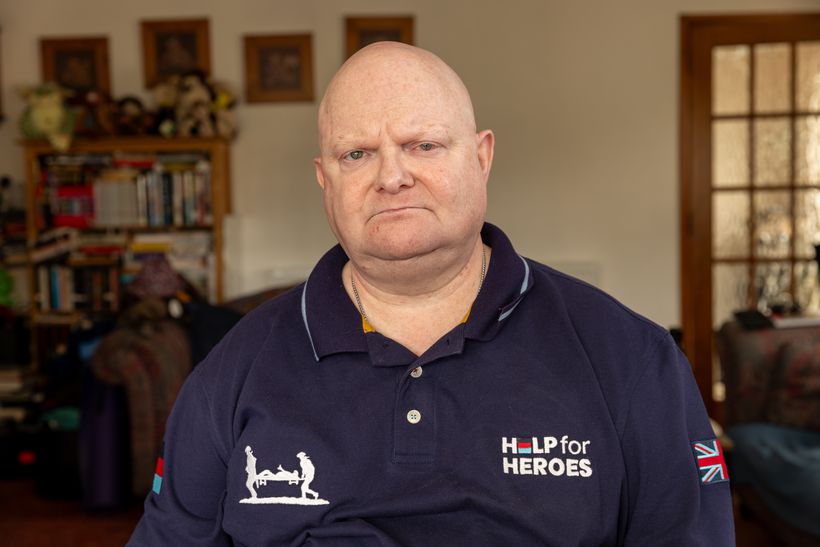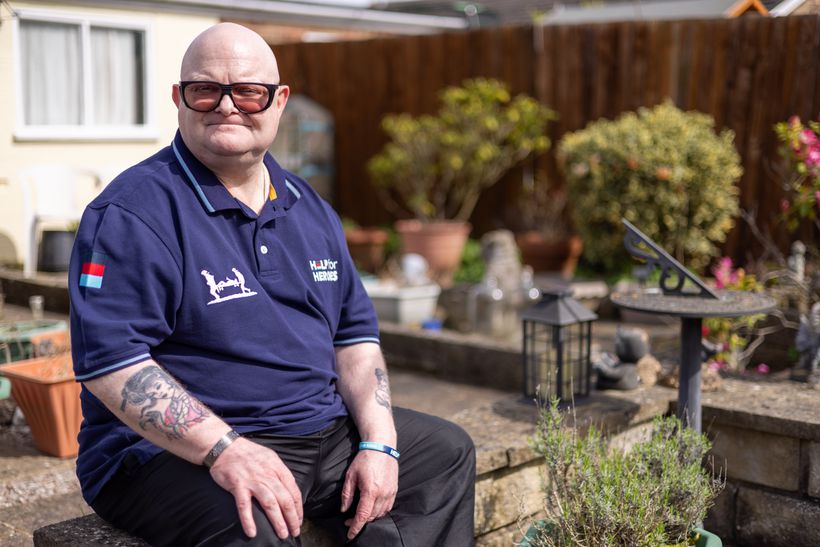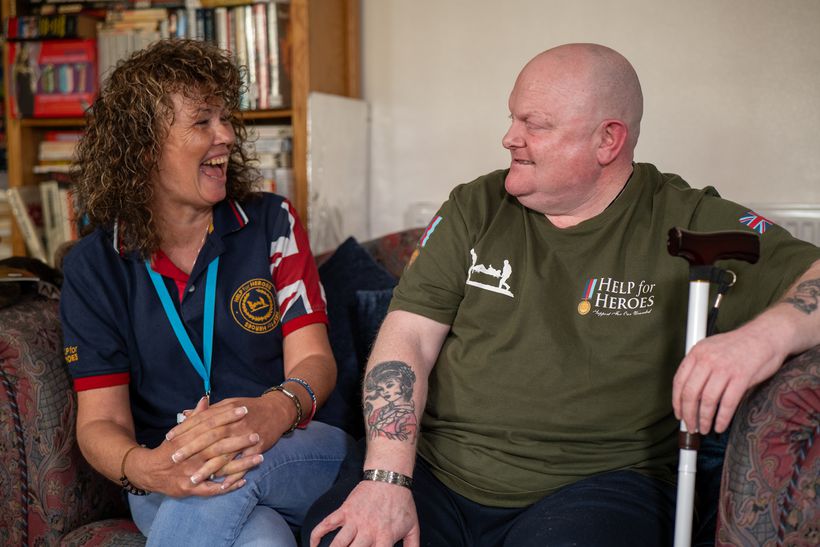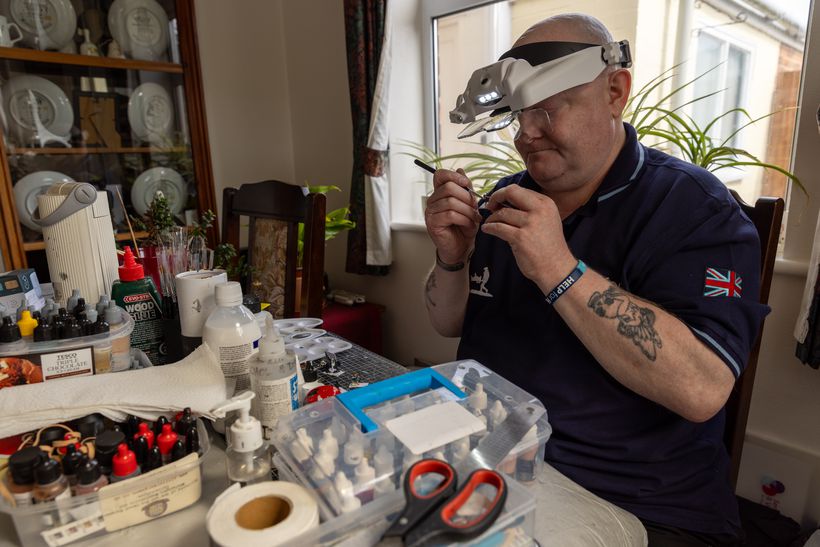Updated on
For three years Shaun hid from the world.
The former soldier served on the frontline in Northern Ireland, the First Gulf War, and on three tours of Bosnia. But there were days he was too frightened to go to his local shops, as his mental health and self-confidence hit rock bottom.
After 22 years in the Army he has constant pain in his back, neck, shoulders, knees, wrists and ankles. He’s lost most of his sight and hearing. All of which doctors said has been caused by his military service.
Wracked with complex PTSD, things were stacking up against Shaun.
The Army was all I knew
“I joined when I was 19. For 22 years the Army was all I knew. As a young man it was like they took my brain out and put in an Army pamphlet.
“When my time was up in the Army, I didn’t only lose my job, overnight I lost my home, way of life, and all my friends. I lost my identity. It’s taken me 12 years since to work out who I am.
“I thought the best thing to do was sever all my links with the Army and start a new life. But I wasn’t ready for it.
“Apart from going to work, I didn’t leave the house for three years. I was scared to.
“And I didn’t ask for help for eight years. I thought asking for help was a sign of weakness.”
Hiding away
“After the Army I had difficulty staying in a job. I worked as a security guard and my colleagues didn’t care about the work they were doing. My brain couldn’t compute that. In the military we always did things properly. So, I quit that job.
“I then worked part time as a school caretaker. When things got too much and I needed to hide from people, I went into the woods and dug a hole in the mud. In the infantry, we called it a shell scrape. And I would hide there.”
My new regiments
“I had a counsellor through the NHS, but he didn’t understand me. He asked me what was causing my trauma and when I said the thought of machine guns, bombs and riots he just looked at me.
“The NHS also couldn’t offer me the chance to meet other veterans. I didn’t realise how much I need to be around others who have served.
“It was hard to communicate with civilians. Both at work and healthcare professionals.
“I wasn’t happy. I was keeping a lot to myself.”
Since getting help from military charities, including us, Shaun’s witty and bubbly personality has returned.
“Help for Heroes and Blind Veterans UK are my new regiments now,” Shaun said.
I can deal with this
Shaun’s had support for his PTSD from our bespoke mental health service for veterans and families, Hidden Wounds.
“They made me realise ‘hold on a minute, I can deal with this’. I was finally being listened to properly for the first time in a long time, and that was the biggest thing for me.”
Lasting impact
There are many impacts of Army life that will remain with Shaun, for better or worse.
“When I was in Bosnia I started getting rashes and swelling all over my body.
“I had to be airlifted back to the UK for treatment before returning to Bosnia to complete my tour.”
Shaun receives the War Pension for his sight loss and PTSD. His sight loss is due to a condition called chronic idiopathic urticaria, which is thought to have been caused by his time in the First Gulf War.
Shaun was injured several times in the Army which has impacted his musculoskeletal health.
“When I was getting in a helicopter in South Armagh, I was putting my bergen on and I fell back through the open door onto concrete.”
And the mental trauma has been just as painful.
“I was diagnosed with PTSD by an Army doctor in 1993.
“They think the PTSD started when I joined the Army. When the training to kill started. And then when you’re learning about nuclear, biological and chemical warfare and what it can do to you.
“I still sleep downstairs because of my PTSD. I used to have night tremors. I’d scream at night and thrash my limbs around and accidently hit my partner.
“My PTSD is a lot better now. I haven’t been cured of it, but I’ve been taught how to live with it. Now if I have a wobble it might last three hours, it won’t last three days as it did in the past.
“My partner Sheree has been amazing. What I’ve been through has affected her a lot.”
Talking the same language
Shaun has regular visits from a nurse in our veterans clinical services team. Karen served with the Queen Alexandra’s Royal Army Nursing Corps for more than 40 years. She helps Shaun manage his physical healthcare journey and her visits reduce his social isolation.
“Karen has been with me for two years. Because she was in the Army we have a common bond. We talk the same language.
“She’s a lifeline for me. Sheree works every day from 8am to 6pm. So that’s a long time sat inside by myself.
“Knowing there’s a community out there with Help for Heroes who have my back, that’s huge.”
Back in control
Karen recently took Shaun to a Help for Heroes activity weekend.
“It was fantastic and I am still buzzing,” said Shaun. “I did archery, climbing and I went on a zip wire. I really threw myself into the weekend.
“It was great being around other veterans. I didn’t feel like I had to prove anything. We all supported one another.
“Everybody at that weekend had been through the darkest of times. But Help for Heroes showed people there was light at the end of the tunnel.
“Archery was hard for me because I couldn’t see it well. But I had a go and I loved it. I got three bulls eyes. I just enjoyed having a go.
“It's taken Karen two years to get me on one of those weekends.”
Thanks to Karen’s help and Shaun’s growing self-confidence, he gets out and about in his local community now, walking round the block and visiting the shops, using his white stick.
Shaun has a passion for model making. He’s currently making and painting a Roman battalion.
“I can see things close up. I spend 10 to 20 minutes on my models and then I need to pause. I have a passion for Ancient Roman history. I research it and find it fascinating. I’m a member of the Society of Ancients, which is a historical war gaming society.
“Things are so different now. I am happy and confident again. I can talk to people. I feel alright about the future.
“I control my PTSD. It doesn’t control me.”







